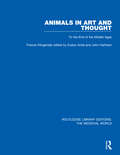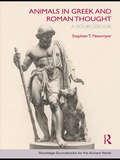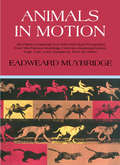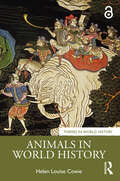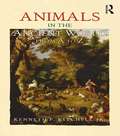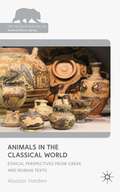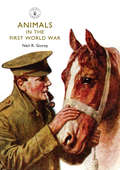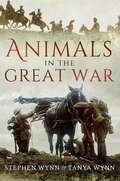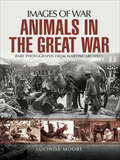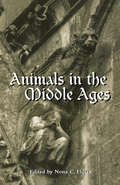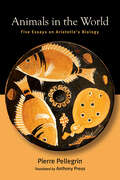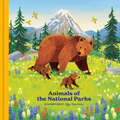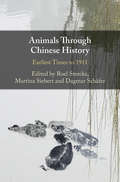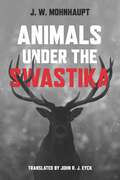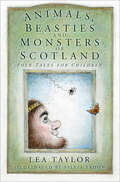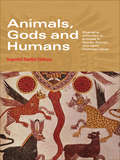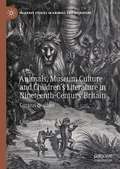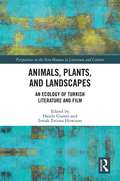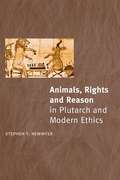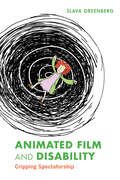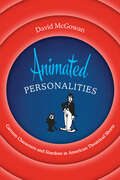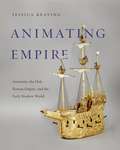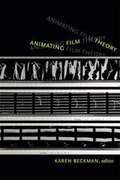- Table View
- List View
Animals in Art and Thought: To the End of the Middle Ages (Routledge Library Editions: The Medieval World #28)
by Francis KlingenderOriginally published in 1971, Animals in Art and Thought discusses the ways in which animals have been used by man in art and literature. The book looks at how they have been used to symbolise religious, social and political beliefs, as well as their pragmatic use by hunters, sportsmen, and farmers. The book discusses these various attitudes in a survey which ranges from prehistoric cave art to the later Middle Ages. The book is especially concerned with uncovering the latent, as well as the manifest meanings of animal art, and presents a detailed examination of the literary and archaeological monuments of the periods covered in the book. The book discusses the themes of Creation myths of the pagan and Christian religion, the contribution of the animal art of the ancient contribution of the animal art of the ancient Orient to the development of the Romanesque and gothic styles in Europe, the use of beast fables in social or political satire, and the heroic associations of animals in medieval chivalry.
Animals in Greek and Roman Thought: A Sourcebook (Routledge Sourcebooks for the Ancient World)
by Stephen T. NewmyerAlthough reasoned discourse on human-animal relations is often considered a late twentieth-century phenomenon, ethical debate over animals and how humans should treat them can be traced back to the philosophers and literati of the classical world. From Stoic assertions that humans owe nothing to animals that are intellectually foreign to them, to Plutarch's impassioned arguments for animals as sentient and rational beings, it is clear that modern debate owes much to Greco-Roman thought. Animals in Greek and Roman Thought brings together new translations of classical passages which contributed to ancient debate on the nature of animals and their relationship to human beings. The selections chosen come primarily from philosophical and natural historical works, as well as religious, poetic and biographical works. The questions discussed include: Do animals differ from humans intellectually? Were animals created for the use of humankind? Should animals be used for food, sport, or sacrifice? Can animals be our friends? The selections are arranged thematically and, within themes, chronologically. A commentary precedes each excerpt, transliterations of Greek and Latin technical terms are provided, and each entry includes bibliographic suggestions for further reading.
Animals in Motion
by Eadweard Muybridge"The dry plate's most spectacular early use was by Eadweard Muybridge." -- Life"A really marvelous series of plates." -- Nature (London)"These photographs have resolved many complicated questions." -- Art JournalHere is the largest, most comprehensive selection of Muybridge's famous animal photos -- more than 4,000 high-speed shots of 34 different animals and birds, in 123 different types of actions. Animals are shown walking, running, leaping, flying -- in typical actions. The horse alone is shown in more than 40 different ways: galloping with nude rider, trotting, pacing with sulky, cantering, jumping hurdles, carrying, rolling on barrels, and 36 other actions. All photos taken against ruled backgrounds; most actions taken from 3 angles at once: 90 degrees, 60 degrees, rear. Foreshortened views are included. These are true action photos, stopped in series, taken at speeds up to 1/2000th of a second. Actions are illustrated in series, with as many as 50 shots per action. Muybridge worked with the University of Pennsylvania for three years, made more than 100,000 exposures, and spent more than $50,000. His work has never been superseded as a lifetime reference for animators, illustrators, artists, and art directors.
Animals in World History (Themes in World History)
by Helen Louise CowieThis volume provides a concise synthesis of human-animal relations over time, charting shifting attitudes towards animals from domestication to the present day. It asks how non-human species have shaped human history, and how humans have reconfigured the animal world.Humans have had a long and close relationship with animals. They have hunted them, consumed them as food and fashion, exploited them as energy sources, utilised them in warfare, exhibited them in zoos and menageries, and studied them for science. In the process, they have radically changed the way in which many animals live, subjecting them to captivity, altering their diets, constraining their movements and, through selective breeding, reshaping their bodies. The book explores the use of animals for sustenance, labour, companionship and display, and traces the rise of the animal rights movement. It also assesses how humans have impacted the overall biodiversity of the planet, driving some species of animals to extinction and permitting others to colonise new continents. With case studies on animal astronauts, celebrity kakapos, globetrotting pandas and cocaine hippos, Animals in World History offers a lively and accessible introduction to human-animal relations for students and instructors of animal studies, environmental history, and social and cultural history.
Animals in the Ancient World from A to Z (The Ancient World from A to Z)
by Kenneth F. Kitchell Jr.The ancient Greeks and Romans lived in a world teeming with animals. Animals were integral to ancient commerce, war, love, literature and art. Inside the city they were found as pets, pests, and parasites. They could be sacred, sacrificed, liminal, workers, or intruders from the wild. Beyond the city domesticated animals were herded and bred for profit and wild animals were hunted for pleasure and gain alike. Specialists like Aristotle, Aelian, Pliny and Seneca studied their anatomy and behavior. Geographers and travelers described new lands in terms of their animals. Animals are to be seen on every possible artistic medium, woven into cloth and inlaid into furniture. They are the subject of proverbs, oaths and dreams. Magicians, physicians and lovers turned to animals and their parts for their crafts. They paraded before kings, inhabited palaces, and entertained the poor in the arena. Quite literally, animals pervaded the ancient world from A-Z. In entries ranging from short to long, Kenneth Kitchell offers insight into this commonly overlooked world, covering representative and intriguing examples of mammals, reptiles, amphibians and invertebrates. Familiar animals such as the cow, dog, fox and donkey are treated along with more exotic animals such as the babirussa, pangolin, and dugong. The evidence adduced ranges from Minoan times to the Late Roman Empire and is taken from archaeology, ancient authors, inscriptions, papyri, coins, mosaics and all other artistic media. Whenever possible reasoned identifications are given for ancient animal names and the realities behind animal lore are brought forth. Why did the ancients think hippopotamuses practiced blood letting on themselves? How do you catch a monkey? Why were hyenas thought to be hermaphroditic? Was there really a vampire moth? Entries are accompanied by full citations to ancient authors and an extensive bibliography. Of use to Classics students and scholars, but written in a style designed to engage anyone interested in Greco-Roman antiquity, Animals in the Ancient World from A to Z reveals the extent and importance of the animal world to the ancient Greeks and Romans. It answers many questions, asks several more, and seeks to stimulate further research in this important field.
Animals in the Classical World
by Alastair HardenThis sourcebook presents nearly 200 specially-translated Greek and Roman texts from Homer to Plutarch, revealing the place of the animal in the moral consciousness of the Classical era. Philosophical, historical, dramatic and poetic texts explore how animals were regarded in all aspects of ancient life, from philosophy to farming.
Animals in the First World War
by Neil StoreyAnimals played an important part in helping the Allies win the First World War, well beyond cavalry horses that charged fields and hauled heavy guns, and included a variety of animals in different but essential service. Pigeons were trained to carry messages, dogs sniffed out wounded soldiers on battlefields, and camels were used for desert transport on the frontlines. Some animals acted as vital morale boosters and mascots like ships' cats even baby orangutans! This book examines the jobs that these animals did, achieving heroic feats and simple acts of loyalty and companionship, all with enormous value in winning the war for the Allies.
Animals in the Great War
by Stephen Wynn Tanya Wynn&“Cats, rabbits and even the bear that inspired Winnie the Pooh appear in remarkable photos of the 16 million animals caught up in World War One.&” —DailyMail.com Animals in the Great War looks at the use of animals by all sides in the Great War and to what effect. In the main, it focuses greatly on horses, dogs and pigeons but also addresses the war efforts of other animals. In the early years of the war horses were, to a large extent, the only form of transport that was available to the British Army, ranging from use by cavalry units, artillery units as well others such as the Army Ordnance Corps for the conveying of ammunition supplies to men fighting at the front. Britain sent an estimated one million horses to fight in the war, most of them to France and Belgium, but only 60,000 of them ever returned home, and only then were they returned because of the intervention of Winston Churchill. Dogs also played a major role in the war, especially in the trenches on the Western Front. They were used as mascots by the different regiments and in some cases, they were companions for homesick soldiers. They were also used for sentry duties in the trenches as well as catching rats, and they were used as messengers and to sniff out wounded soldiers in No Man&’s Land. Animals in the Great War explores how everyday domestic animals were transformed into remarkable wartime heroes, who more than did their bit for the war effort.
Animals in the Great War (Images of War)
by Lucinda MooreTails from the Great War throws a spot light on the experience of creatures great and small during the First World War, vividly telling their stories through the incredible archival images of the Mary Evans Picture Library. The enduring public interest in Michael Morpurgos tale of the war horse reveals an enthusiasm for the animal perspective on war, but what of the untold stories of the war dog, the trench rat or even the ships pig? Through unrivaled access to rarely seen illustrated wartime magazines, books and postcards, discover the sea lions who were trained to detect submarines, and witness the carcass of the 61ft mine-destroying wonder whale. Meet the dog that brought a sailor back from the brink of death, and inspired a Hollywood legend. See how depictions of animals were powerfully manipulated by the propaganda machine on both sides, and how the presence of animals could bring much needed and even lifesaving companionship and cheer amid the carnage of war. As the centenary of the Great War is commemorated all over the world, take a timely journey via the lens of Mary Evans wartime images, and marvel at the often overlooked but significant contribution and experience of animals at war. By turns astonishing, heart-warming and occasionally downright bizarre, Tails from the Great War champions the little-known story of the bison, the chameleon, the canary et al in wartime.
Animals in the Middle Ages: A Book Of Essays (Routledge Medieval Casebooks #Vol. 13)
by Nona C. FloresThese interdisciplinary essays focus on animals as symbols, ideas, or images in medieval art and literature.
Animals in the World: Five Essays on Aristotle's Biology (SUNY series in Ancient Greek Philosophy)
by Pierre PellegrinIn Animals in the World, renowned Aristotle scholar Pierre Pellegrin attempts to demonstrate that Aristotle, by proposing an original version of natural perfection, opposes the whole of the Greek tradition. Nature is perfect, not only in its harmony of a complete and well-organized whole, but also because it brings together functionally perfect individuals.
Animals of the National Parks: An Alphabet Book
by Fifty-Nine ParksFor nature lovers of any age, this book is a beautiful A-to-Z introduction to the wild and wonderful animals that live in America's national parks. Featuring art from the beloved printmakers and poster illustrators at Fifty-Nine Parks.America's national parks are some of the most magical places in the world, and home to a diverse array of creatures, both well known and more unusual. From American Bison (which are also the largest mammals in the parks) to flying squirrels (which can glide the length of a football field) to Xeme (which take two full years to grow their adult feathers), this picture book takes children on an enchanting alphabetical adventure through the natural world.The book features fascinating facts about each animal, including information on where they can be found. A passport page to record visits and an illustrated map of all the national parks will encourage children and their families to make the most of every trip. With beautifully evocative art that's nostalgic yet contemporary, this is a special gift for outdoor and national park lovers of all ages.
Animals through Chinese History: Earliest Times to 1911
by Roel Sterckx Dagmar Schäfer Martina SiebertThis volume opens a door into the rich history of animals in China. As environmental historians turn their attention to expanded chronologies of natural change, something new can be said about human history through animals and about the globally diverse cultural and historical dynamics that have led to perceptions of animals as wild or cultures as civilized. This innovative collection of essays spanning Chinese history reveals how relations between past and present, lived and literary reality, have been central to how information about animals and the natural world has been processed and evaluated in China. Drawing on an extensive array of primary sources, ranging from ritual texts to poetry to veterinary science, this volume explores developments in the human-animal relationship through Chinese history and the ways in which the Chinese have thought about the world with and through animals. This title is also available as Open Access.
Animals under the Swastika
by Jan Wolf MohnhauptNever before or since have animals played as significant a role in German history as they did during the Third Reich. Potato beetles and silkworms were used as weapons of war, pigs were used in propaganda, and dog breeding served the Nazis as a model for their racial theories. Paradoxically, some animals were put under special protection while some humans were simultaneously declared unworthy of living. Ultimately, the ways in which Nazis conceptualized and used animals—both literally and symbolically—reveals much about their racist and bigoted attitudes toward other humans. Drawing from diaries, journals, school textbooks, and printed propaganda, J.W. Mohnhaupt tells these animals’ stories vividly and with an eye for everyday detail, focusing each chapter on a different facet of Nazism by way of a specific animal species: red deer, horses, cats, and more. Animals under the Swastika illustrates the complicated, thought-provoking relationship between Nazis and animals.
Animals under the Swastika
by Jan Wolf MohnhauptNever before or since have animals played as significant a role in German history as they did during the Third Reich. Potato beetles and silkworms were used as weapons of war, pigs were used in propaganda, and dog breeding served the Nazis as a model for their racial theories. Paradoxically, some animals were put under special protection while some humans were simultaneously declared unworthy of living. Ultimately, the ways in which Nazis conceptualized and used animals—both literally and symbolically—reveals much about their racist and bigoted attitudes toward other humans. Drawing from diaries, journals, school textbooks, and printed propaganda, J.W. Mohnhaupt tells these animals’ stories vividly and with an eye for everyday detail, focusing each chapter on a different facet of Nazism by way of a specific animal species: red deer, horses, cats, and more. Animals under the Swastika illustrates the complicated, thought-provoking relationship between Nazis and animals.
Animals, Beasties and Monsters of Scotland: Folk Tales for Children
by Lea Taylor Sylvia TroonWhat do you think happened when Jack refused to do his chores? Do you think you’re clever enough to hide from Dundee’s dragon? Watch out for Lefty the spider dying to tell you his story about life in the glen … The stories in this book are of animals, beasties and monsters that are fast and cunning and scary and big. And they are ready to tell their tales to you …
Animals, Gods and Humans: Changing Attitudes to Animals in Greek, Roman and Early Christian Thought
by Ingvild Saelid GilhusConsulting a wide range of key texts and source material, Animals, Gods and Humans covers 800 years and provides a detailed analysis of early Christian attitudes to, and the position of, animals in Greek and Roman life and thought. Both the pagan and Christian conceptions of animals are rich and multilayered, and Ingvild Sælid Gilhus expertly examines the dominant themes and developments in the conception of animals. Including study of: biographies of figures such as Apollonus of Tyana; natural history; the New Testament via Gnostic texts; the church fathers; and from pagan and Christian criticism of animal sacrifice, to the acts of martyrs, the source material and detailed analysis included in this volume make it a veritable feast of information for all classicists.
Animals, Museum Culture and Children’s Literature in Nineteenth-Century Britain: Curious Beasties (Palgrave Studies in Animals and Literature)
by Laurence TalairachAnimals, Museum Culture and Children’s Literature in Nineteenth-Century Britain: Curious Beasties explores the relationship between the zoological and palaeontological specimens brought back from around the world in the long nineteenth century—be they alive, stuffed or fossilised—and the development of children’s literature at this time. Children’s literature emerged as dizzying numbers of new species flooded into Britain with scientific expeditions, from giraffes and hippopotami to kangaroos, wombats, platypuses or sloths. As the book argues, late Georgian, Victorian and Edwardian children’s writers took part in the urge for mass education and presented the world and its curious creatures to children, often borrowing from their museum culture and its objects to map out that world. This original exploration illuminates how children’s literature dealt with the new ordering of the world, offering a unique viewpoint on the construction of science in the long nineteenth century.
Animals, Plants, and Landscapes: An Ecology of Turkish Literature and Film (Perspectives on the Non-Human in Literature and Culture)
by Hande Gurses Irmak Ertuna HowisonThe landscape of Turkey, with its trees and animals inspires narratives of survival, struggle and escape. Animals, Plants, and Landscapes: An Ecology of Turkish Literature and Film, will be the first major study to offer fresh theoretical insight into this landscape, by offering a collection of analyses of key texts of Turkish literature and cinema. Through discussion of both classical and contemporary works, this volume, paves the way for the formation of a ecocritical canon in Turkish literature and the rise of certain themes that are unique to Turkish experience. Snakes, fishermen and fish who catch men, porcupines contemplating on human agency, dogs exiled on an island and men who put dogs to fights, goat herders and windy steppes of Anatolia are all agents in a territory that constantly shifts. The essays included in this volume demonstrate the ways in which the crystallized relations between human and non-human form, break, and transform.
Animals, Rights and Reason in Plutarch and Modern Ethics
by Stephen T. NewmyerThis groundbreaking volume explores Plutarch's unique survival in the argument that animals are rational and sentient, and that we, as humans, must take notice of their interests. Exploring Plutarch's three animal-related treatises, as well as passages from his ethical treatises, Stephen Newmyer examines arguments that, strikingly, foreshadow those found in the works of such prominent animal rights philosophers as Peter Singer and Tom Regan. Unique in viewing Plutarch’s opinions not only in the context of ancient philosophical and ethical through, but also in its place in the history of animal rights speculation, Animals Rights and Reasons points out how remarkably Plutarch differs from such anti-animal thinkers as the Stoics. Classicists, philosophers, animal-welfare students and interested readers will all find this book an invaluable and informative addition to their reading.
Animated Film and Disability: Cripping Spectatorship
by Slava GreenbergWhile many live-action films portray disability as a spectacle, "crip animation" (a genre of animated films that celebrates disabled people's lived experiences) uses a variety of techniques like clay animation, puppets, pixilation, and computer-generated animation to represent the inner worlds of people with disabilities. Crip animation has the potential to challenge the ableist gaze and immerse viewers in an alternative bodily experience.In Animated Film and Disability, Slava Greenberg analyzes over 30 animated works about disabilities, including Rocks in My Pockets, An Eyeful of Sound, and A Shift in Perception. He considers the ableism of live-action cinematography, the involvement of filmmakers with disabilities in the production process, and the evocation of the spectators' senses of sight and hearing, consequently subverting traditional spectatorship and listenership hierarchies. In addition, Greenberg explores physical and sensory accessibility in theaters and suggests new ways to accommodate cinematic screenings.Offering an introduction to disability studies and crip theory for film, media, and animation scholars, Animated Film and Disability demonstrates that crip animation has the power to breach the spectator's comfort, evoking awareness of their own bodies and, in certain cases, their social privileges.
Animated Personalities: Cartoon Characters and Stardom in American Theatrical Shorts
by David McGowanThis pioneering book makes the case that iconic cartoon characters, such as Mickey Mouse, are legitimate cinematic stars, just as popular human actors are.Mickey Mouse, Betty Boop, Donald Duck, Bugs Bunny, Felix the Cat, and other beloved cartoon characters have entertained media audiences for almost a century, outliving the human stars who were once their contemporaries in studio-era Hollywood. In Animated Personalities, David McGowan asserts that iconic American theatrical short cartoon characters should be legitimately regarded as stars, equal to their live-action counterparts, not only because they have enjoyed long careers, but also because their star personas have been created and marketed in ways also used for cinematic celebrities.Drawing on detailed archival research, McGowan analyzes how Hollywood studios constructed and manipulated the star personas of the animated characters they owned. He shows how cartoon actors frequently kept pace with their human counterparts, granting &“interviews,&” allowing &“candid&” photographs, endorsing products, and generally behaving as actual actors did—for example, Donald Duck served his country during World War II, and Mickey Mouse was even embroiled in scandal. Challenging the notion that studios needed actors with physical bodies and real off-screen lives to create stars, McGowan demonstrates that media texts have successfully articulated an off-screen existence for animated characters. Following cartoon stars from silent movies to contemporary film and television, this groundbreaking book broadens the scope of star studies to include animation, concluding with provocative questions about the nature of stardom in an age of digitally enhanced filmmaking technologies.&“[Animated Personalities] is impressive for its lucid historical structure and exceptionally enjoyable content . . . McGowan breathes life into celluloid figures, giving readers a backstory for some of the most enduring iconic characters of screen history. This is a truly gratifying book.&” —Choice&“Combining historical, formal, and theoretical modes of analysis, Animated Personalities represents a vital contribution to both star studies and the study of animation in classical Hollywood and beyond. By embracing a key problematic of the study of stardom―the inability to take any element of its construction as authentic―McGowan does not undermine the validity of this approach so much as craft a more honest and complete understanding of it.&” —Synoptique
Animating Empire: Automata, the Holy Roman Empire, and the Early Modern World
by Jessica KeatingIn the sixteenth and seventeenth centuries, German clockwork automata were collected, displayed, and given as gifts throughout the Holy Roman, Ottoman, and Mughal Empires. In Animating Empire, Jessica Keating recounts the lost history of six such objects and reveals the religious, social, and political meaning they held.The intricate gilt, silver, enameled, and bejeweled clockwork automata, almost exclusively crafted in the city of Augsburg, represented a variety of subjects in motion, from religious figures to animals. Their movements were driven by gears, wheels, and springs painstakingly assembled by clockmakers. Typically wound up and activated by someone in a position of power, these objects and the theological and political arguments they made were highly valued by German-speaking nobility. They were often given as gifts and as tribute payment, and they played remarkable roles in the Holy Roman Empire, particularly with regard to courtly notions about the important early modern issues of universal Christian monarchy, the Reformation, the Counter-Reformation, the encroachment of the Ottoman Empire, and global trade.Demonstrating how automata produced in the Holy Roman Empire spoke to a convergence of historical, religious, and political circumstances, Animating Empire is a fascinating analysis of the animation of inanimate matter in the early modern period. It will appeal especially to art historians and historians of early modern Europe.E-book editions have been made possible through support of the Art History Publication Initiative (AHPI), a collaborative grant from the Andrew W. Mellon Foundation.
Animating Empire: Automata, the Holy Roman Empire, and the Early Modern World
by Jessica KeatingIn the sixteenth and seventeenth centuries, German clockwork automata were collected, displayed, and given as gifts throughout the Holy Roman, Ottoman, and Mughal Empires. In Animating Empire, Jessica Keating recounts the lost history of six such objects and reveals the religious, social, and political meaning they held.The intricate gilt, silver, enameled, and bejeweled clockwork automata, almost exclusively crafted in the city of Augsburg, represented a variety of subjects in motion, from religious figures to animals. Their movements were driven by gears, wheels, and springs painstakingly assembled by clockmakers. Typically wound up and activated by someone in a position of power, these objects and the theological and political arguments they made were highly valued by German-speaking nobility. They were often given as gifts and as tribute payment, and they played remarkable roles in the Holy Roman Empire, particularly with regard to courtly notions about the important early modern issues of universal Christian monarchy, the Reformation, the Counter-Reformation, the encroachment of the Ottoman Empire, and global trade.Demonstrating how automata produced in the Holy Roman Empire spoke to a convergence of historical, religious, and political circumstances, Animating Empire is a fascinating analysis of the animation of inanimate matter in the early modern period. It will appeal especially to art historians and historians of early modern Europe.E-book editions have been made possible through support of the Art History Publication Initiative (AHPI), a collaborative grant from the Andrew W. Mellon Foundation.
Animating Film Theory
by Karen BeckmanAnimating Film Theory provides an enriched understanding of the relationship between two of the most unwieldy and unstable organizing concepts in cinema and media studies: animation and film theory. For the most part, animation has been excluded from the purview of film theory. The contributors to this collection consider the reasons for this marginalization while also bringing attention to key historical contributions across a wide range of animation practices, geographic and linguistic terrains, and historical periods. They delve deep into questions of how animation might best be understood, as well as how it relates to concepts such as the still, the moving image, the frame, animism, and utopia. The contributors take on the kinds of theoretical questions that have remained underexplored because, as Karen Beckman argues, scholars of cinema and media studies have allowed themselves to be constrained by too narrow a sense of what cinema is. This collection reanimates and expands film studies by taking the concept of animation seriously.Contributors. Karen Beckman, Suzanne Buchan, Scott Bukatman, Alan Cholodenko, Yuriko Furuhata, Alexander R. Galloway, Oliver Gaycken, Bishnupriya Ghosh, Tom Gunning, Andrew R. Johnston, Hervé Joubert-Laurencin, Gertrud Koch, Thomas LaMarre, Christopher P. Lehman, Esther Leslie, John MacKay, Mihaela Mihailova, Marc Steinberg, Tess Takahashi
